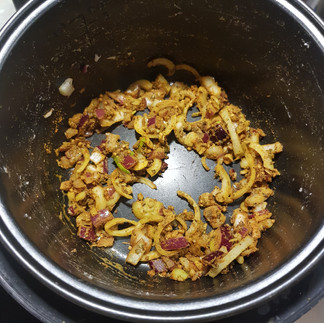
Did you know that you can make some pretty great one-pot meals using a simple rice cooker?!
To be honest with you, the idea of one appliance being good for just one specific thing (rice-cooker for cooking rice) always made me feel like it's just a bit silly to invest in. So when I realized I actually owned a hand-me-down, barely-ever-used rice-cooker, I decided to experiment a bit and see if I could use it for a little more than just cooking rice. And it turns out that it can cook some wonderfully delicious stews, curries and dahls!
Sure, it's definitely better if you have an appliance that was designed for it, like a pressure cooker, but if, like me, you don't have that and you happen to have a rice cooker, I've found that you can totally make it work for so much more than just rice!
Even with the simplest one I happen to have, which only has an on/off function, it's still possible to cook a whole variety of stew-, dhal-, curry-like one-pot dishes.
If you can cook on the stove in a large pot or a deep pan, it's definitely a better option, but if, for whatever reason, you can't, but you do have a rice cooker, yummy, wholesome, plant-based deliciousness is still possible and it's sooo easy!
This is also a perfect way to slowly start getting into plant-based cooking, and/or if you're trying to eat healthier and you'd like to make sure your meals are homemade, but you just can't stand the thought of actually cooking them yourself, (been there, done that- I know the feeling, although it seems like a lifetime ago now), you may think about using your rice cooker or getting a proper pressure cooker or Thermomix to do most of the cooking for you.
All you need to do is to chop up your veggies and chuck them in in the correct order (but even if you mess this up it's still okay) and let it cook!
Minimal clean-up, minimal prep-time, perfect for when you don't have all day to spend in the kitchen or even when you don't even have a kitchen!
I so wish I knew this back when I was a student!
The How-To, a brief guideline.
It's fine to throw in all the veggies at once, but for best results follow the same guidelines as you would if you were cooking in a regular pot or pan on the stove.
Start with your onions and a pinch of salt followed by the rest of the onion family that cooks a bit faster (garlic, leek, etc.).
Add in your spices (my personal go-to's are: herbs de Provence, ground cumin, turmeric and black pepper along with Tamari) and fry everything as if it was a pan- until the onions start becoming translucent.
You can fry with a small amount of oil or, for no-oil options, you can use a tablespoon of coconut milk or simply water.
Next add the veggies in the order of their cooking time- starting for the longest cooking ones.
Mix everything well and add in enough water (and/or coconut milk, if using) to cover all the veggies.
If you're adding canned legumes add them in now, remember to drain and rinse them beforehand.
Let everything cook (with the lid down, closed) for as long as the longest-cooking veggies need to soften enough to be ready to eat- this may vary depending on the veggies you're using and the size of their chunks, so check on them once in a while.
(Depending on your appliance and the amount of liquid you're using, you may also find that it's good to open the rice cooker and gently stir everything every once in a while so it doesn't stick to the bottom).
I usually like to add in my greens such as baby spinach or kale and/or Chinese cabbage towards the end as well and allow them to cook with everything for the last couple of minutes.
You totally can cook these kinds of meals with your grain of choice inside, (this way, along with the legumes you can really create a full balanced plant-based meal all in one-pot!), but I actually prefer to cook my grains (rice, quinoa, or whatever I'm having) separately. I still use the same rice cooker, I just cook the rice first and then then veggies. Alternatively, you can cook the veggies, transfer them to a glass container when they're done and use the same pot (without washing it!) to cook your grains. This way it'll cook in all of the flavors of your curry/stew! And that's even less clean-up for you!
All the stews/curries below were cooked in a rice-cooker:
































Commentaires